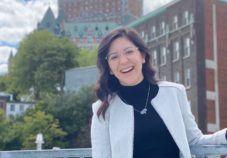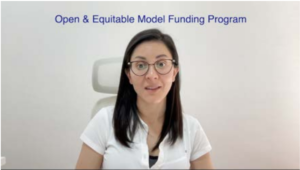
Eunice Mercado-Lara
Title
ORFG Civic Science Fellow
Year
2021
Project focus: In collaboration with the Health Research Alliance, Eunice will work toward increasing both openness and equity within funding programs by helping to develop, launch, and oversee an Open and Equitable Model Funding Program to address inequities in the research community.
About Eunice
Eunice Mercado-Lara is the Civic Science Fellow at the Open Research Funders Group. She leads the Open & Equitable Model Funding Program, a research funders community of practice to pilot interventions to make grantmaking practices more equitable and to incentivize open and collaborative scholarly practices. Over the last eight years, she has worked mainly in the public sector to help funding agencies and universities align incentives and policies to advance open research. Eunice 23 served as a board and committee member in several international organizations and initiatives advocating for openness, such as CERN’s SCOAP3 initiative, the Open Access Week, and the OpenCon LATAM.
HTTPS://WWW.OPENANDEQUITABLE.ORG/
1. What was the focus of your work as a Civic Science Fellow? What did you do?
I worked at the Open Research Funders Group to develop a program for research funders to pilot interventions in their grant-making processes to make research funding more inclusive and positively impact research culture by incentivizing open scholarship practices and further collaboration among grantees.
The Open & Equitable Model Funding Program offers a set of 32 recommendations for research funders, all of which were jointly built with a Working Group that includes representatives from four research funding philanthropies, scholars, scientists, and activists working at the intersection of open research and marginalized communities.
The program also gathered a cohort of 11 pioneer research funders that are road-testing these recommendations and sharing lessons learned in real time during the cohort’s monthly sessions. We want to create actionable knowledge for the broader science philanthropic community so that any research funder can benefit from this pilot. This is why all our recommendations and templates are publicly available on our website for anyone to read, download, or comment on.
2. How do you hope your work as a Fellow will influence the future—for yourself, an organization, a community, or a field?
Perhaps the most powerful tool research funders have to make a change is the dollars they invest through their funding mechanisms. My work as a fellow developing the Open & Equitable Model Funding Program created a tool that most of the members of the philanthropic science community trying to embed equity principles throughout all the stages of their grantmaking processes can benefit from since it provides actionable and road-tested recommendations that go from program design, inclusive dissemination of funding opportunities, more equitable ways to support applicants and grantees, etc., and also on how to incentivize and support open scholarship practices to promote more transparent and collaborative research culture.
3. What’s one insight you’d share from your work as a Civic Science Fellow?
In philanthropy, openness and inclusion help build trust with stakeholders and enable organizations to demonstrate the impact of their work. In society, openness promotes accountability and good governance and helps create an environment where all individuals can participate and contribute to creating locally relevant solutions.
Increasing collaboration and openly sharing information and resources in the scientific enterprise usually leads to greater efficiency, better decision-making, and the ability to build upon existing knowledge. Openness also encourages inclusivity and diversity of perspectives, which leads to more innovative ideas and solutions.
This is why science philanthropy must incorporate these values among their organizational priorities; however, throughout my fellowship, I realized most of the recommendations require funding organizations to add more resources and capacities to undertake these additional activities. Science philanthropies usually need to find the right balance between spending money to cover operational costs or spending it to fund more research proposals to solve the challenges they were created for. This healthy tension makes it crucial for science philanthropies to be more efficient and collectively identify challenges and solutions instead of duplicating the work by doing it individually. Such as we did in the Open & Equitable Model Funding Program.
Video (click for link):
